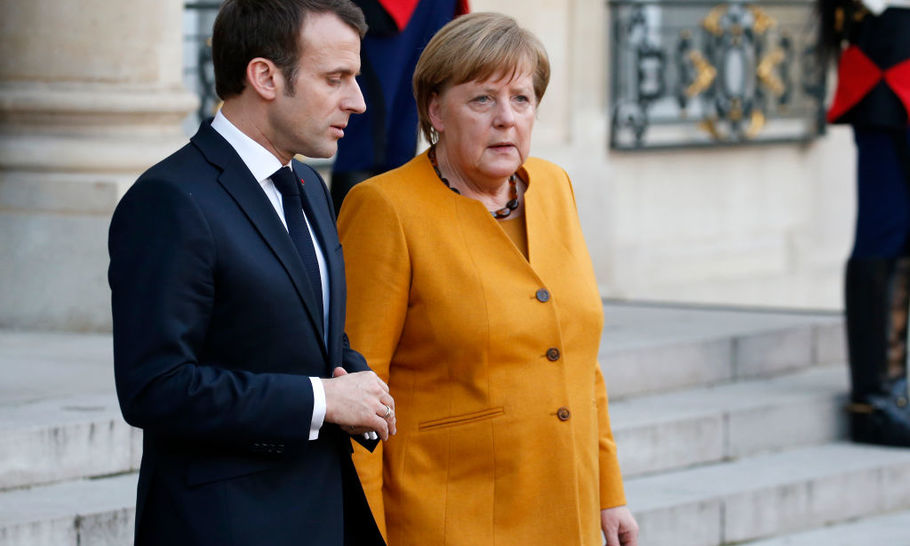MPs can't take an Article 50 extension for granted

(Photo by Chesnot/Getty Images)
This month was supposed to be the UK’s last in the EU, but it looks increasingly likely that the looming 29th March deadline will be delayed. After a month of cross-party pressure, and with threats of ministerial resignations, the Prime Minister finally accepted the substantive provisions of what became known as the ‘Cooper amendment’ (after the Labour MP Yvette Cooper who tabled it). The upshot is that if the latest version of the Government’s Brexit deal is voted down on 12th March, there will be a vote on 13th March on leaving the EU without a deal. If MPs vote against this – and they will – then there will be another vote on 14th March on whether Theresa May should seek a short delay to Brexit.
So far, so good for Cooper and co. But delaying Brexit, via an extension of the two-year Article 50 process, cannot be taken for granted. As the MPs pushing for it are well aware, any extension will have to be approved unanimously by all 27 EU member states. European Commission President Jean Claude-Juncker may say that nobody in Europe would oppose extension, but it isn’t up to him. The UK will not be negotiating with Juncker or Michel Barnier, but with the likes of German Chancellor Angela Merkel and French President Emmanuel Macron.
The 27 are not of one mind on this. Merkel said this week, “if the UK requires more time, we won’t deny them that.” The Irish are also keen – indeed, Taoiseach Leo Varadkar raised the question of extension with May when she was still refusing to countenance it. Others are more sceptical. Pedro Sanchez of Spain, for example, says, “prolonging uncertainty by postponing deadlines is not a reasonable nor desirable alternative.”
The biggest obstacle, however, is France. Macron threw a grenade into the UK debate this week this week when he said, “We would in no way accept an extension without a clear objective.” This gets to the heart of the issue. As I have previously pointed out, there is a view in European capitals, particularly Paris, that delay for the sake of delay is pointless. Other countries have expressed this view too. Mark Rutte of the Netherlands – one of the UK’s closest allies in Europe – said this week, “If the UK asks for delay, the EU will ask: what do you want with it? We don’t want to go round in circles for the next couple of months.” This prediction of “going round in circles” has no doubt been informed by MPs’ inability to face up to hard choices so far. Why would more time change that?
It is likely at this point that the Government will end up applying for an extension of some sort. But if France will only allow this with a “clear objective,” then both the Government and MPs will need to start thinking about what that objective is. Fear of No Deal may not cut it – especially given that No Deal could still happen anyway at the end of the extension. A so-called “technical” extension, in a situation where Parliament has passed the Withdrawal Agreement but needs extra time to get the domestic implementation of it through, would be a no-brainer from the EU’s point of view. But if it looks like the deal is never going to pass, then they may be more reluctant. And renegotiation remains off the table.
Of course, Macron’s threat could be an empty one, designed to focus the minds of MPs – something he has form for. Sources close to him have previously briefed that they will insist on a very long extension – 21 months has been mentioned. It is hard to see this as anything other than a bluff to convince wavering MPs to vote for the deal; in practice, a 21-month extension would not be in the EU’s interests at all. Equally, Macron’s own domestic political problems need to be appreciated. With the Gilets Jaunes running riot and important European elections coming up, one can see why Macron doesn’t like the idea of being distracted by two more months of Westminster shenanigans.
The gap between London and European capitals on Article 50 extension is instructive of a wider problem that has beset UK politics throughout the Brexit process. Brexiteers and Remainers alike have failed to understand a fundamental truth that the UK cannot unilaterally determine its relationship with the EU. Forcing the Prime Minister to concede an extension in principle is all very well, but is pointless if EU countries refuse – or attach conditions that make the extension politically unpalatable to the UK.
As Open Europe have previously pointed out, there are broader reasons why an Article extension is not the silver bullet that MPs seem to think it is. For example, there is a risk it eats into the transition period – which has a fixed end-date, not a fixed length – and therefore curtails the time available to negotiate the future trading relationship. The procedural hurdle created by May’s European Parliament elections is also well known. But the political risks of UK participation are arguably more significant. How on earth would you explain to voters why they are being asked to vote in elections to an organisation the country voted to leave nearly three years ago? MPs are well aware of this, and the elections may therefore take on the role of a hard deadline around late June (new MEPs don’t take their seats until 1 July). This may yet create late momentum behind a version of the Prime Minister’s deal.
Ultimately, delaying Brexit merely postpones the choice which MPs have to make – a version of the deal, No Deal, or no Brexit. Any Article 50 extension can only work as a bridge to one of these options – it should not be seen as an end in itself.





